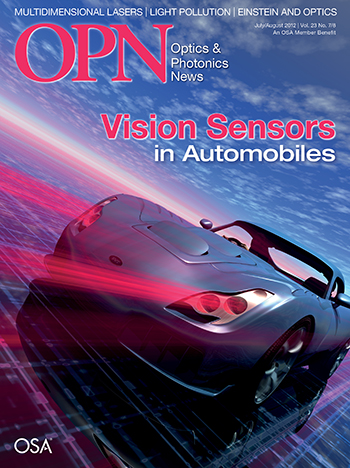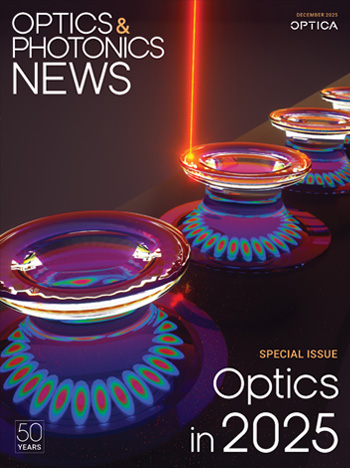
July/August 2012 Issue
Feature Articles
Vision Sensors in Automobiles: An Indian Perspective
Traffic accidents kill more people than most diseases—and the roads in India are among the most dangerous in the world. CMOS-based vision sensors could help save lives by extending drivers’ sight far beyond their mirrors and headlights, enabling them to react more quickly to potential hazards.
by Mukul SarkarLight Pollution: The Problem and the Possible Solutions
Over the past quarter-century, scientists have become increasingly aware of the problems that light pollution causes for astronomers, migrating birds and human health and safety. Finding effective means to reduce the effects will take the combined efforts of research scientists, lighting engineers, architects, city planners, businesspeople and homeowners.
by Patricia DaukantasBeyond the Beam: A History of Multidimensional Lasers
For the past half century, both scientists and the public have come to think of lasers as producing line-like beams. Yet there’s nothing about the laser that requires light emission to occur in a single dimension. Though initially forgotten and ignored, multidimensional lasers may define the next era of the technology’s evolution.
by Zoltán György HorváthAlbert Einstein and the Nature of Light
Einstein’s genius lay in his ability to bridge the gap between radiation in space and radiation-matter interactions. He explained the interaction between light and matter by the absorption and emission of light quanta, thereby explaining several perplexing physical phenomena.
by Barry R. MastersDepartments and Columns
Optimal Light Extraction is Key to Solar-Cell Efficiency
Managing the photons within a gallium arsenide solar cell to maximize its external fluorescence was the key step to realizing its record efficiency.
Choosing a Career at a National Lab
Physics or engineering graduate students often see only two choices for their career paths—academia in one direction and industry in the other. However, there’s a third option: a national laboratory. Tyler Ralston talks about his experience working for a national lab and the unique opportunities that this career choice provides.
Digital Stain Could Reveal Cancerous Cells
Scientists at the Imperial College, London, U.K., have developed a mid-infrared imaging method to assist in quickly identifying cancerous cells.
Lessons from an Editorial Term
OSA Fellow Pablo Artal recently finished his second and final term as a topical editor of the Journal of the Optical Society of America A. Here, he shares his advice to authors and reviewers based on his six years of experience.
An international group of researchers reports that a simple, secondary speckle-sensing microscopy technique quickly and correctly identified malaria in cells
Burst-Mode Laser Captures Combustion Details
American researchers have devised a new-type of laser that provides bursts lasting 10 times longer than previous examples—enough to enable “movies” of these reactions.
Automated Inspection of Optics using ISO Specifications
Representatives from Research Electro-Optics Inc., a precision optics manufacturer, explain how to quickly and accurately identify surface defects using an automated microscope-based system that follows the ISO 10110-7 specification.
Zograscopes: An 18th Century Perspective on 3-D Imaging
So-called perspective machines were popular parlor amusements in the 18th and 19th centuries. Also known as zograscopes or boites d’optique, these devices brought flat images to life in the days before stereoscopic imaging.
Fiber Optics in India: A Nomad’s Journey
A post-doc regales us with cultural and scientific observations from his trip to fiber optics labs throughout India.
Photonics Explorer: Working within the Curriculum to Engage Young Minds
The Photonics Explorer teaching kit is designed to work within the European secondary school curriculum. This approach allows teachers to easily incorporate optics and photonics into their lesson plans and introduces more students to this exciting field.
Presidential Profile: Boris Peter Stoicheff
Boris Peter Stoicheff was OSA’s 1976 President and a key player in the laser spectroscopy revolution. He was a dedicated researcher, teacher, author and friend.
Also in this Issue
Remembering William R. Hunter, Guoguang Mu, Douglas S. Goodman and Elias Snitzer.


![Manual probe system with needles for test of semiconductor on silicon wafer. [A. Morozov / Getty]](https://opnmedia.blob.core.windows.net/$web/opn/media/images/articles/2025/1125/departments/202511-cover-web.jpg?ext=.jpg)
![Researcher Clara Saraceno in the lab. [Image by Carsten Behler Photography]](https://opnmedia.blob.core.windows.net/$web/opn/media/images/articles/2025/1025/departments/202510-cover-web.jpg?ext=.jpg)
